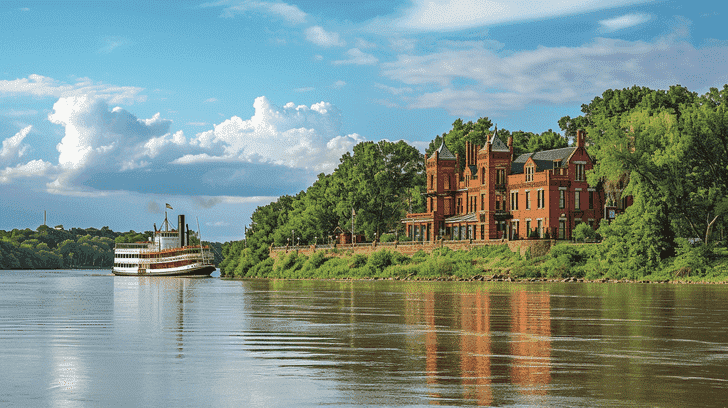
Get ready to be amazed by the incredible history and notable events that have shaped Peoria, Illinois. This city has a past so rich and diverse, it will leave you in awe.
From being the oldest European settlement in Illinois to its pivotal role as a major port on the Illinois River, Peoria has played a significant part in the growth and development of the state.
But that’s not all – did you know that Peoria was once the hub of the whiskey industry in the United States? With a plethora of distilleries calling this city home, it was a major player in the world of spirits.
And let’s not forget about its agricultural heritage, as Peoria served as a bustling trading and shipping center for crops like corn, soybeans, and livestock.
Intrigued? Well, hold on tight because there’s so much more to discover about the captivating history and notable events that have shaped Peoria, Illinois.
About Peoria Illinois
Peoria, Illinois, located on the Illinois River, is a city with a rich history and a diverse economy. Known for its landmarks, attractions, culture, demographics, and economy, Peoria offers a wide range of experiences.
The city is home to several notable landmarks, including the Pettengill-Morron House, the John C. Flanagan House, and the Peoria Riverfront Museum. These landmarks showcase the city’s historical significance and cultural heritage.
In terms of attractions, Peoria offers a variety of options, from exploring the beautiful Illinois River to enjoying the vibrant arts scene in the city.
With a diverse population, Peoria boasts a mix of cultures, traditions, and perspectives, contributing to its vibrant and inclusive community.
The city’s economy is well diversified, with a focus on manufacturing industries, including the production of earthmoving equipment, metal products, and farm equipment. Peoria’s economy also benefits from its position as a major port on the Illinois River, facilitating trade and shipping for the surrounding agricultural area.
History
As we shift our focus to the history of Peoria, Illinois, it’s important to explore the origins and early settlement of this historic city along the Illinois River. Here are four key points to help you understand the history of Peoria:
-
Explorers: Peoria’s history begins with the arrival of French explorers, including Henri de Tonti, who established the first European settlement in the area in 1691.
-
French settlement: The French built Fort Crevecoeur in the Peoria area, which served as a trading post and military outpost. However, the fort was eventually destroyed by fire.
-
Native American tribes: The Peoria tribe, a member of the Illinois Confederation, played a significant role in the region’s history. The city was named after this tribe.
-
Early European settlers: After the French, early European settlers began to establish permanent settlements in Peoria, leading to its official incorporation as a village in 1835 and as a city in 1845.
These historical events laid the foundation for the vibrant and diverse city that Peoria is today.
Notable Events
Notable events have shaped the history of Peoria, Illinois, leaving a lasting impact on the city’s development and identity.
One such event was the Peoria War, which took place from September 19 to October 21, 1813. This conflict between the Native American tribes and the United States government had a significant influence on the region.
In 1844, Abraham Lincoln became involved in the Aquilla Wren divorce case, which he took to the Supreme Court of Illinois.
Another notable event was the start of Charles Lindbergh’s first air mail route, Contract Air Mail route #2, on April 15, 1926. This route ran from Chicago to Peoria to Springfield to St. Louis and back.
Additionally, in 1942, Penicillium chrysogenum, the fungus used to produce penicillin, was first isolated from a moldy cantaloupe found in a grocery store in Peoria.
Conclusion
In conclusion, Peoria, Illinois isn’t just your average historic city. It’s a time capsule of captivating stories and remarkable events that have shaped its vibrant character.
From being the oldest European settlement in Illinois to its pivotal role in the whiskey industry, Peoria has left an indelible mark on the state’s history.
Its agricultural heritage and significance as a trading center further adds to its impressive resume.
Peoria is truly a city that has stood the test of time, preserving its rich past for all to explore and admire.
References